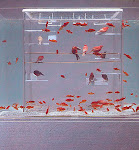 One of the greatest struggles in life is to love someone who doesn’t return a similar regard. Such a trial can fundamentally alter a person as occurred in Susan Vreeland’s portrayal of Suzanne Manet. When she arrived in the Manet’s home as a piano instructor, Suzanne was a kind, quiet soul whose qualities were appreciated by the household. How can I know this? Simple, her thoughts allude to how she respects people and tries to see the good in them. It’s as though she bends over backward to please those around her while never asking for anything herself.
One of the greatest struggles in life is to love someone who doesn’t return a similar regard. Such a trial can fundamentally alter a person as occurred in Susan Vreeland’s portrayal of Suzanne Manet. When she arrived in the Manet’s home as a piano instructor, Suzanne was a kind, quiet soul whose qualities were appreciated by the household. How can I know this? Simple, her thoughts allude to how she respects people and tries to see the good in them. It’s as though she bends over backward to please those around her while never asking for anything herself.These are admirable qualities under caring circumstances, but the life she led was quite nearly wretched. Not only was she forced to endure the pain of a flagrantly unfaithful husband, salt was rubbed into her wounds by her very home which was filled with her husband’s art. There was no escape for her. Paintings depicting his other lovers hung on their walls for all to see and admire. All except Suzanne, for whom it must have been sheer torture to share her home with paintings like Olympia, which depicted a known French courtesan who was one of her husband’s lovers. “The French had a way about them, an assurance she envied. Her differential Dutchness kept the peace, but that was all, while Olympia had mocked her with that barefaced impudence every day of her married life.” Everything that she’d dreamed of was held by Olympia, a woman named Victorine Meurent, along with many others and there was nothing she could do about it.
The transformation which Suzanne’s character underwent is completely understandable when considered from this perspective. She truly loved Eduardo Manet even with the torture he put her though. The tightly woven web of emotions that had built up inside of her because of this lifestyle altered her soft spoken nature. Suzanne had been merely a spectator in her own life. Yet, in Edouard’s illness and eventual death, she found the strength to make herself anew so as to never be trod upon again. It was this new woman who sat beside her beloved husband’s bed as he lay dying from syphilis. It was also this new woman who confronted Victorine when she asked for money directly after Edouard’s death. “’A collaborator’ - she [Suzanne] uttered the word as if its taste on her tongue was vile - ‘is merely a fleeting accomplice in a painting, which is, after all, a fantasy. A wife, the deepest kind of friend, is a life partner. Through everything.’” Suzanne spoke the truth to Victorine. She had been through everything with her husband; both the good and the bad. In the end, she chose to alter her life by becoming strong and independent enough to face the world by herself.
I appreciate Vreeland’s portrayal of the change that Suzanne Manet undergoes and the strength which she exhibits toward the end of the story. Yet, I’m still inclined to feel that her writing style is a bit too choppy for her stories to effectively draw a reader in. She assumes that readers know too much of Manet’s history. In fact, if I hadn’t had some background on the story, I’d have been completely lost by the time that I was halfway through. Vreeland continuously references people, places, things, and sometimes even techniques that leave readers without background in the middle of a storm of nearly nonsensical verbiage. But, she also has power in her writing. For all of this story’s choppiness, I’d enjoy learning more of how Vreeland portrayed Suzanne and maybe gain some insights into the real Suzanne Manet’s personality.
~
Image: Edouard Manet - Lecture (Suzanne Manet)
http://commons.wikimedia.org/wiki/File:Manet,_Edouard_-_Lecture.jpg


"She assumes that readers know too much of Manet's history."
ReplyDeleteBut I thought that you loved history! *smirk*
Oh, bite me! You know that I don't make a hobby of studying history! *mock scowl*
ReplyDelete